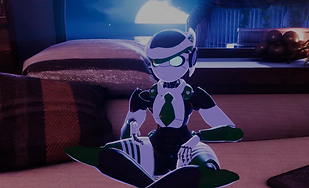
Phantom Touch

You are in a different body
A place far away from everyone who knows you
What is left to tell who you are.. and who you want to be?

This VR story, created in unity3D, follows the journey of a female VRChat player who, while navigating her autism, begins to heal past traumas through virtual interactions with others. With an avatar of her choice and new ways to interact with others in VR social spaces, she challenges old rules that once confined her, rebuilding her connections with people and the world.
Through virtual intimacy and phantom touch, she discovers and embraces her true self, both in the virtual realm and in reality.
I am the experience designer and audio designer of this project, responsible for 3D environment design and user-experience flow.
Background
VRChat is a multiplayer VR game released in 2014 that can be played on VR headsets or on a PC. Everyone interacts behind 3D avatars, and virtual reality enhances the illusion/immersion that the people and environments you encounter are "real."
Within this platform, people create their own bodies and worlds. Many connect with others who share similar interests or struggles. Some even sleep with their headsets on, fall in love with the individuals behind digital avatars, or engage in intimate experiences in private spaces. The vast number of maps and built-in interactions offer activities that mirror reality, casting new light on familiar experiences. Here, people live alternative lives, and most profoundly, some discover and express their true selves—both virtually and in reality—by adopting avatars that reflect who they aspire to be or how they wish to be seen.
Through the voice of a VRChat player named FriendlyGhost, who presents herself in a robotic model that preserves and escapes from her female identity, who lives with autism and hypersexuality, and takes on a robotic model to express herself safely in the virtual world, we delve into parasocial relationships and how they empower individuals to discover and express their true selves and desires.




9-minute VR Playthrough Time
Process Overview
7 Months, 3 People, 2 Interviewees, 1 story
Experience Designer: Felicity Chen
Producer: Felicity Chen & Hejunchao Researcher: Hejunchao Li & Felicity Chen
Lead programmer: Nova Lu
Level design: Felicity Chen
Audio Design: Felicity Chen
#Unity3D
#Oculus Interaction SDK
#VRchat
2024.1

2024.2-2024.4
Degree
University Name

Research and interview:
At the stage of pre-production, the most difficult issue we came across is to build connections with potential users who have never used VR before, or envisioned the possibility of living another life online.
There's a key question we need to explore:
"why can't people live their full potential as themselves?"
After months of researching, exploration, frustration, and countless interviews with strangers on VRchat, including queer communities, filmmakers, and full-body mo-cap dancers in VRchat, I met FriendlyGhost in a newly developed bar in VRchat, telling her story.
Concept:
We were clear about our vision: we wanted to tell a story through the voice of a female interviewee, focusing on the potential that virtual worlds and shared imagination offer for redefining our lives and identities by disassociating from our physical bodies and societal structures. We also aimed to challenge the construction of gender norms in the digital era.
2024.5-2024.7


Ideation and paper Edit
Friendlyghost's journey of healing from personal trauma and understanding and navigating her autism within a controlled, safe online space serves as the foundation of our story. Her perspectives on real and virtual body representation, virtual intimacy, and her lived experience with autism add depth and nuance to our narrative.
As a team, we discussed the core strengths and potential weaknesses of the story, brainstorming ideas and drawing inspiration from museums, games, and films.
As the experience designer, I crafted the user flow based on the interview material, created wireframes, and collaboratively built the prototype after three rounds of testing and iteration.
Visual research and storyboard





